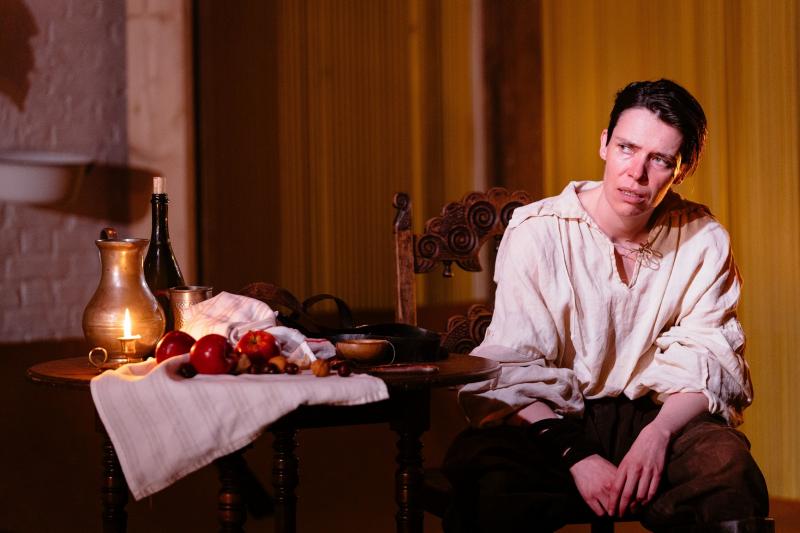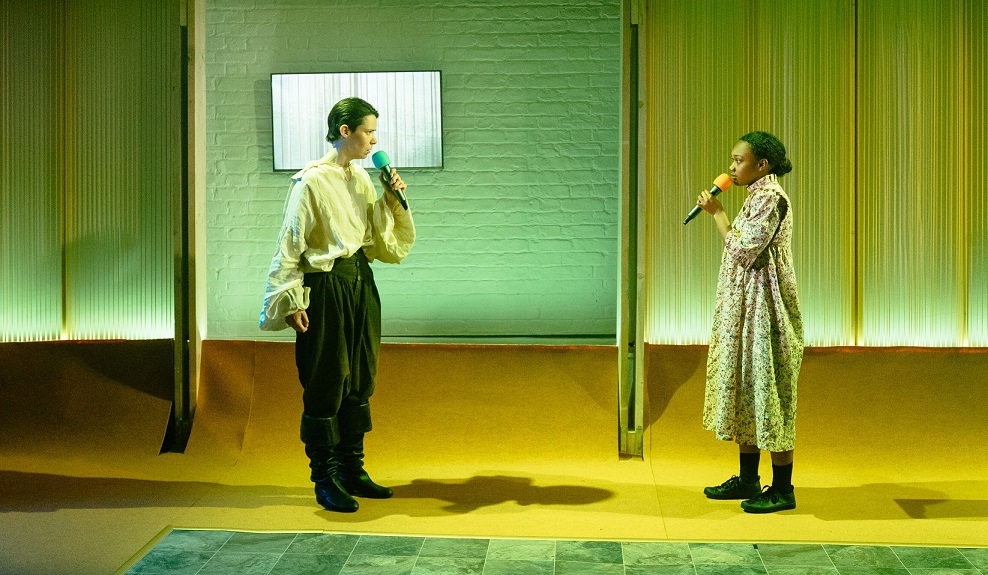The Crucible, The Yard Theatre review - wilfully over-stirred | reviews, news & interviews
The Crucible, The Yard Theatre review - wilfully over-stirred
The Crucible, The Yard Theatre review - wilfully over-stirred
Arthur Miller’s possession drama staged for spectacle

The Crucible is a play that speaks with unrelenting power at times of discord, most of all when the public consciousness looks ripe for manipulation.
I wish I could say that the result was more illuminating. Jay Miller works with a strikingly young cast of nine, the necessary doubling confidently handled and most of the main roles powerfully defined, some close to excellent towards the end of the three-hour run. But they’re up against a collection of directorial ploys that Miller and his production collaborators throw at the show, the effect of which ranges from occasional diversion to outright gimmickry.
It starts out as a paradigm of ensemble work, the cast assembled in what looks like a church hall (complete with spun-thread decor and stove), each occupying a chair marked with the name of their character while the play’s immediate context (complete with stage directions) is sketched out through group narration, with an am-dram effect that is almost radio drama. But gradually they move into the action, the players rising from their seats, their interaction elaborating the balance of these small-town relationships; gradually, too, their diction slips into more defined American accents. It’s begun in modern dress, but Act II moves the Proctor household back to period, at least for the couple themselves, until the court scene of Act III settles on a sort of contemporary totalitarian, a briskly assertive style that convinces, unlike what has come before, as the visual articulation of a particular world. Coherence in costume (Oliver Cronk) and set design (Cécile Trémoilères) is obviously fluid, and the more striking elements here are Josh Anio Grigg’s growingly remorseless soundscapes – just how much does tension have to be wound up? – and Jess Bernberg’s lighting work, which fluctuates between wildly different hues, intimate yellow one minute, cold grey-green the next.
It’s begun in modern dress, but Act II moves the Proctor household back to period, at least for the couple themselves, until the court scene of Act III settles on a sort of contemporary totalitarian, a briskly assertive style that convinces, unlike what has come before, as the visual articulation of a particular world. Coherence in costume (Oliver Cronk) and set design (Cécile Trémoilères) is obviously fluid, and the more striking elements here are Josh Anio Grigg’s growingly remorseless soundscapes – just how much does tension have to be wound up? – and Jess Bernberg’s lighting work, which fluctuates between wildly different hues, intimate yellow one minute, cold grey-green the next.
The impression that spectacle is out to dominate over character becomes even more pronounced after the interval, as Miller winds up the technical add-ons – a karaoke interpolation, angled screen texts and images, microphone work and echo sound, blank-masked aliens lurking (we presume) as witches, flash and strobe effects. It’s a cacophony of stylisation that risks turning the actors into ciphers in a show that looks exaggerated even for a work about possession.
The fact that the cast comes through with distinction is despite rather than because of the production. Emma D’Arcy has an intimate power as Elizabeth Proctor, and there's a later quiet intenstity to Sorcha Groundsell as Mary Warren (their prim visages would look at home in the original Salem setting). As Judge Danforth, who's made into a compilation character here, Jacob James Beswick controls the court with bureaucratic efficiency, dominating those over whom he presides; prime among them is Nina Cassells’ Abigail, convincingly complicated elsewhere but hampered by having to play out her secret meeting scene with Proctor via hand microphone (pictured above).
The vaunted cross-casting of Dunne does nothing to amplify the role, with accompanying vocal and physical uncertainties in fact reducing the character. That said, Miller’s final husband-and-wife encounter is so strong that its prolonged, agonising drama of moral decision can’t fail to move. It achieves a stark power otherwise rare in this over-stirred Crucible.
The future of Arts Journalism
You can stop theartsdesk.com closing!
We urgently need financing to survive. Our fundraising drive has thus far raised £49,000 but we need to reach £100,000 or we will be forced to close. Please contribute here: https://gofund.me/c3f6033d
And if you can forward this information to anyone who might assist, we’d be grateful.

Subscribe to theartsdesk.com
Thank you for continuing to read our work on theartsdesk.com. For unlimited access to every article in its entirety, including our archive of more than 15,000 pieces, we're asking for £5 per month or £40 per year. We feel it's a very good deal, and hope you do too.
To take a subscription now simply click here.
And if you're looking for that extra gift for a friend or family member, why not treat them to a theartsdesk.com gift subscription?
more Theatre
 Wendy & Peter Pan, Barbican Theatre review - mixed bag of panto and comic play, turned up to 11
The RSC adaptation is aimed at children, though all will thrill to its spectacle
Wendy & Peter Pan, Barbican Theatre review - mixed bag of panto and comic play, turned up to 11
The RSC adaptation is aimed at children, though all will thrill to its spectacle
 Hedda, Orange Tree Theatre review - a monument reimagined, perhaps even improved
Scandinavian masterpiece transplanted into a London reeling from the ravages of war
Hedda, Orange Tree Theatre review - a monument reimagined, perhaps even improved
Scandinavian masterpiece transplanted into a London reeling from the ravages of war
 The Assembled Parties, Hampstead review - a rarity, a well-made play delivered straight
Witty but poignant tribute to the strength of family ties as all around disintegrates
The Assembled Parties, Hampstead review - a rarity, a well-made play delivered straight
Witty but poignant tribute to the strength of family ties as all around disintegrates
 Mary Page Marlowe, Old Vic review - a starry portrait of a splintered life
Tracy Letts's Off Broadway play makes a shimmeringly powerful London debut
Mary Page Marlowe, Old Vic review - a starry portrait of a splintered life
Tracy Letts's Off Broadway play makes a shimmeringly powerful London debut
 Little Brother, Soho Theatre review - light, bright but emotionally true
This Verity Bargate Award-winning dramedy is entertaining as well as thought provoking
Little Brother, Soho Theatre review - light, bright but emotionally true
This Verity Bargate Award-winning dramedy is entertaining as well as thought provoking
 The Unbelievers, Royal Court Theatre - grimly compelling, powerfully performed
Nick Payne's new play is amongst his best
The Unbelievers, Royal Court Theatre - grimly compelling, powerfully performed
Nick Payne's new play is amongst his best
 The Maids, Donmar Warehouse review - vibrant cast lost in a spectacular-looking fever dream
Kip Williams revises Genet, with little gained in the update except eye-popping visuals
The Maids, Donmar Warehouse review - vibrant cast lost in a spectacular-looking fever dream
Kip Williams revises Genet, with little gained in the update except eye-popping visuals
 Ragdoll, Jermyn Street Theatre review - compelling and emotionally truthful
Katherine Moar returns with a Patty Hearst-inspired follow up to her debut hit 'Farm Hall'
Ragdoll, Jermyn Street Theatre review - compelling and emotionally truthful
Katherine Moar returns with a Patty Hearst-inspired follow up to her debut hit 'Farm Hall'
 Troilus and Cressida, Globe Theatre review - a 'problem play' with added problems
Raucous and carnivalesque, but also ugly and incomprehensible
Troilus and Cressida, Globe Theatre review - a 'problem play' with added problems
Raucous and carnivalesque, but also ugly and incomprehensible
 Clarkston, Trafalgar Theatre review - two lads on a road to nowhere
Netflix star, Joe Locke, is the selling point of a production that needs one
Clarkston, Trafalgar Theatre review - two lads on a road to nowhere
Netflix star, Joe Locke, is the selling point of a production that needs one
 Ghost Stories, Peacock Theatre review - spirited staging but short on scares
Impressive spectacle saves an ageing show in an unsuitable venue
Ghost Stories, Peacock Theatre review - spirited staging but short on scares
Impressive spectacle saves an ageing show in an unsuitable venue
 Hamlet, National Theatre review - turning tragedy to comedy is no joke
Hiran Abeyeskera’s childlike prince falls flat in a mixed production
Hamlet, National Theatre review - turning tragedy to comedy is no joke
Hiran Abeyeskera’s childlike prince falls flat in a mixed production

Add comment